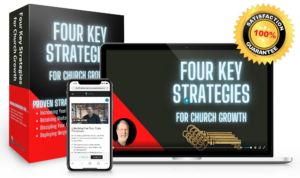First let me say this: The lead pastor is ultimately responsible for EVERYTHING the church is called to do. From worship to weddings, finances to funerals, bulletins to butts in seats, discipleship to digging the weeds, annual planning to plunging toilets, and vision to visiting, the buck stops with the person sitting behind the pastor’s desk. The sad thing, though, is too many pastors will read that sentence and think, “Yep. And I do all that plus sing in the choir and lead Sunday school.
But please read that first sentence again, though.
The lead pastor is ultimately responsible for EVERYTHING the church is called to do. Share on XNotice what that sentence doesn’t say. It doesn’t say it’s the pastor’s responsibility to DO everything. Instead, it’s the pastor’s responsibility to make sure everything gets done. They’re responsible FOR everything, just like a corporation’s CEO is responsible for everything that happens in the company.
The role of the lead pastor has changed over the years. Back “in the day,” the pastor was trained in seminary to do much of the church’s ministry. In part, this is because over the years the congregation treated the pastor as their employee who was hired to do all those “ministerial” tasks that the laity really didn’t want to do. Of course, that’s not the biblical model. It’s very clear that the role of the clergy is to equip church members to do the ministry (see Ephesians 4:11–13 for the mandate and Acts 6:1–7 for the application and outcome of that application).
In today’s effective churches, the pastoral role takes seriously the biblical mandates and practices so that, in the end, the pastor should only be tasked with the following:
- Spiritual Modeling. In any church leadership position this is the most important characteristic of all. All leaders, especially the Lead Pastor, must behave according to the congregational expected behaviors and leadership covenants (you do have these covenants, right?). In addition, the Lead Pastor should conspicuously model prayer; personal Bible study (outside of sermon preparation); encouraging the spiritual faith of the one-anothers in a personal way; doing non-anonymous good deeds in the name of Jesus Christ; and sharing faith with the unchurched. In fact, one of the chief responsibilities is that the pastor serves as the primary face of the church in and to the community, implying that much of the pastor’s time is spent outside of the office and off of the church campus.
- Mission Alignment and Fulfillment. The Lead Pastor is responsible to ensure that everything the church does is aligned with its mission, is achieving its vision, and is operating within its values. Any activity/program/event that is not specifically aligned must be evaluated and either brought into full alignment or disbanded. In addition, the lead pastor is ultimately responsible for accomplishing the church’s mission and ensuring the vision is being fulfilled. To that end, Specific, Measurable, Achievable, Results-oriented, and Time-bound objectives (SMART Objectives) should be annually proposed by the lead pastor so that achievement can be measured.
- Vision Casting. The Lead Pastor is responsible for keeping the vision before the congregation as well as alive in the community. The former may be accomplished through preaching, teaching, writing, and conversation. The latter may be accomplished by community involvement – indeed, the Lead Pastor should spend at least ten to fifteen hours each week networking in the community (the smaller the church, the more hours are required in the community in order to grow the church). This networking time should include one-on-one conversations with community leaders, business professionals, non-profit leaders, etc. Time spent with denominational and/or interdenominational Christian groups should not count as networking time (which is not to suggest that time spent with other Christian leaders is unimportant, but let’s be honest – that time is rarely productive and never serves to grow the church).
- Team Building. The primary reason larger churches do not continue to grow is because of ineffective staffing. In many cases the issue is that there is a wrong person in the wrong position. In other cases, the issue is that there is inter-staff conflict, jealousy, etc. The Lead Pastor is responsible for ensuring the right leaders are in the right jobs. Hence it is critical that the Lead Pastor have the authority to fill vacant staff leadership positions with those who are qualified and who are team players. This is no less true in a smaller church, where key leaders will be unpaid ministers who give sacrificially of their time … making team building even more important.
In addition, the Lead Pastor is responsible for building and maintaining team harmony. This can be accomplished in a variety of ways, such as through team events, retreats, open-door policies, etc. Every effort must be taken to ensure the team functions together as a team, rather than as an employee pool. - Fund Raising. Finally, the Lead Pastor is responsible for ensuring the funding of ministry is available. Although the mechanics of stewardship education and drives are addressed in other articles, the Lead Pastor must clearly take a lead in this particular area. However, fund raising via pleas and pledges is only one stroke of the financial picture. Leaders of large non-profit organizations and leaders of large churches understand that key ministries are dependent on significant gifts from individual donors. Additionally, substantial gifts are virtually never given to the organization’s treasurer, financial secretary, or even to the developer. Instead, donors of significant gifts do so only when they are confident in the abilities of the chief leader to deliver “value” commensurate with the gift size. In other words, they want to be sure significant giving will make a significant difference in people’s lives. Therefore, substantial contributions are most often directly solicited by the CEO, president, or in this case, the Lead Pastor.
Do you notice tasks that aren’t there? The first comment we hear from many congregations is, “But what about us? What about pastoral care and hospital visitation and shut-in communion and …” Please re-read Ephesians 4:11–13 – the pastor equips the saints for member care as well as other ministries. Need another example? Luke 15:3–7 tells the story of the good shepherd. In that parable, the shepherd literally abandons the ninety-nine and leaves them to look after themselves while the shepherd takes on the task of reaching the lost. Is this not exactly what we see in the book of Acts? The Apostles spent their time preaching in the public square, in the synagogues, and in often in prison (and not because they were just visiting!) rather than doing member care.
Effective, faithful, and sustainable churches today grow because the Lead Pastors have the margins to engage in life transforming ministries like evangelism and discipleship. They lead well-equipped teams of ministers, sometimes called church members, to do the work and ministry and mission of the church. And when they do, they not only accomplish so much more … they have time be great spouses, parents, neighbors, and spiritually grounded disciples of Jesus Christ.

Need to refocus, get back on track, and grow your church?
Grab your copy of the Four Key Strategies to Sustainable Church Growth video training course. Three videos, three worksheets, four keys to building a foundation for your church’s exponential growth.






[…] afloat, leading to their eventual closure and sale.As we highlighted in a previous post, lead pastors are ultimately responsible for everything the church is meant to do— including finances. Fundraising is only one part of […]